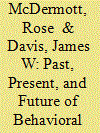| Srl | Item |
| 1 |
ID:
191917


|
|
|
|
|
| Summary/Abstract |
Any act of battlefield violence results from a combination of organizational strategy and a combatant's personal motives. To measure the relative contribution of each, our research design leverages the predictable effect of ambient temperature on human aggression. Using fine-grained data collected by US forces during the Afghanistan and Iraq conflicts, we test whether temperature and violence are linked for attacks that can be initiated by individual combatants, but not for those requiring organizational coordination. To distinguish alternative explanations involving temperature effects on target movements, we examine situations where targets are stationary. We find that when individual combatants have discretion over the initiation of violence, ambient temperature does shape battlefield outcomes. There is no such effect when organizational coordination is necessary. We also find that ambient temperature affects combat-age males’ endorsement of insurgent violence in a survey taken during the conflict in Iraq. Our findings caution against attributing strategic causes to violence and encourage research into how strategic and individual-level motivations interact in conflict.
|
|
|
|
|
|
|
|
|
|
|
|
|
|
|
|
| 2 |
ID:
177785


|
|
|
|
|
| Summary/Abstract |
Originally developed by applying models from cognitive psychology to the study of foreign policy decision making, the field of behavioral IR is undergoing important transformations. Building on a broader range of models, methods, and data from the fields of neuroscience, biology, and genetics, behavioral IR has moved beyond the staid debate between rational choice and psychology and instead investigates the plethora of mechanisms selected by evolution for solving adaptive problems. This opens new opportunities for collaboration between scholars informed by rational choice and behavioral insights. Examining the interactions between the individual's genetic inheritance, social environment, and downstream behavior of individuals and groups, the emerging field of behavioral epigenetics offers novel insights into the methodological problem of aggregation that has confounded efforts to apply behavioral findings to IR. In the first instance empirical, behavioral IR raises numerous normative and philosophical questions best answered in dialogue with political and legal theorists.
|
|
|
|
|
|
|
|
|
|
|
|
|
|
|
|